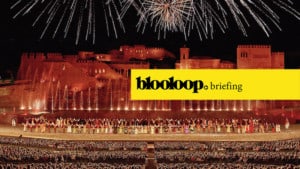 Related: What is more important, recruitment or training? / Smithsonian’s attendance tops record year and Tate outgrow galleries / Whisky and High Ropes in Bonnie Scotland / Chicago’s World Class Museums drawing the crowds
Related: What is more important, recruitment or training? / Smithsonian’s attendance tops record year and Tate outgrow galleries / Whisky and High Ropes in Bonnie Scotland / Chicago’s World Class Museums drawing the crowds
 By Martin Barratt, CEO BALPPA
By Martin Barratt, CEO BALPPA
With the advent of the Coalition, a review seemed much further away. The message came that even mentioning the subject in front of a Minister would damage credibility and cause further delays, and that it wouldn’t be worth mentioning this again for at least four years.
The Coalition was clearly as committed to the issue as Labour who had introduced the bill in December 2001, so it was a surprise when the attack on free entry came from a Labour MP known for his interest in culture and the arts.
Tristram Hunt (below right) is the Labour MP for Stoke-on-Trent Central and a well known historian, broadcaster, columnist and author. He called for an end to free museums not because he doesn’t believe in them, but because he resents museums and galleries in London continuing to enjoy free entry while outside London many will have to start charging again.
In what he calls an “…assault on the region’s arts”, the government has “…cut Renaissance in the  Regions funding, slashed the Arts Council budget and wound down all central support for non-national museums.” This means the reintroduction of admission fees to well known collections such as the People’s History Museum in Manchester and the Museums in Tyne and Wear, as well as the Potteries Museum and Art Gallery in Hunt’s own constituency.
Regions funding, slashed the Arts Council budget and wound down all central support for non-national museums.” This means the reintroduction of admission fees to well known collections such as the People’s History Museum in Manchester and the Museums in Tyne and Wear, as well as the Potteries Museum and Art Gallery in Hunt’s own constituency.
Notwithstanding his motives Munira Mirza(below left), cultural advisor to Boris Johnson the Mayor of London, writing in the London Evening Standard this month, called it alarming that Hunt would call for an end to free museums in London or anywhere else. For a start, she points out, many of the London Museums and Galleries have spawned outposts in Manchester, Leeds and Liverpool and they’re all free. Lucky they are. Many were built before free entry was re-introduced and, because they received lottery funding, they had business plans which said they had to be self supporting. Does anyone believe that developments such as the Imperial War Museum in Manchester and the Royal Armouries in Leeds would still be open if they had to cover their costs?
She chose to ignore Hunt’s point that the real benefit from free entry came not from broadening the audience for art and culture, which was its intention. Instead “…working with schools, a proper outreach strategy and well-funded inclusion programmes” brought the museums to their target  audiences and encouraged some of them to visit. According to a study by Mori, "While the number of people coming through the door might have dramatically increased, the profile of a typical ‘population’ of museum or gallery visitors has remained relatively stable and firmly biased in favour of the ‘traditional’ visitor groups."
audiences and encouraged some of them to visit. According to a study by Mori, "While the number of people coming through the door might have dramatically increased, the profile of a typical ‘population’ of museum or gallery visitors has remained relatively stable and firmly biased in favour of the ‘traditional’ visitor groups."
With that justification gone all that is left is Mirza’s view that the London Museums should remain free to all so that foreign tourists can see objects that may have come from abroad in the first place. Apparently this may stop the Greeks clamouring for the return of the Elgin Marbles and the Egyptians militating for the repatriation of the Rosetta Stone.
For this reason alone we in the commercial attractions sector are being asked to put up with unfair competition. In a time of unprecedented economic hardship, free museums will remain free only to hold off demands to return the treasures bought or stolen from foreign nations to their rightful owners.
With the cultural elite squabbling amongst themselves this could be just the time to push the Coalition to accept that free entry to National Museums failed in its objective to widen the audience for culture and the arts and that it is a system supported only by those who can well afford to pay for their pleasure. To encourage them to look again at a new pricing regime; one that charges tourists a fair amount for their visit but promotes multiple visits to locals and UK tourists.
It was noticeable that when David Cameron made his famous speech on Tourism in July (see: Is the UK Government doing enough for Tourism? ) there was one thing that connected all the attractions he namechecked. They were all free entry and they were all heavily subsidised. Re-evaluating free entry to National Museums is a chance for the Coalition to prove to us in the Commercial Visitor Attractions sector that we are valued too.








